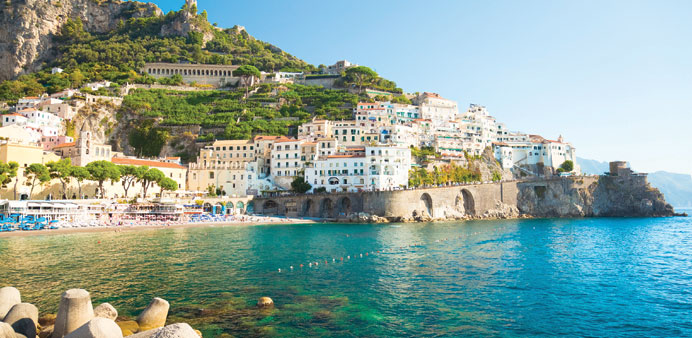Costa Crociere, the Italian cruise line, is bouncing back from its 2012 capsize by offering
slow cruises through the Mediterranean. By Hanns-Jochen Kaffsack
A variety of Mediterranean olive oils are neatly lined up on the table, waiting to be tested by eager tasters.
The setting could be a relaxed gathering for high-net-worth foodies in a palace in Tuscany. But far from it — these people are enjoying a culinary excursion on the Costa neoRiviera cruise ship.
“Filtered oil can be preserved longer,” explains Marco, who is from the University of Gastronomic Sciences in the north Italian city of Pollenzo. At the table, all wait expectantly for how the oils will
actually taste — maybe a touch of pepper, or perhaps almond or even banana?
This is not just about olive oil. Learning how to make fusilli noodles or a favourite dolce — a sweet dessert — will be on the programme later on.
After the appetite-stimulating olive oil, the order of business is to sip an aperitif on the upper deck near the vessel’s funnel.
Welcome to a cruise that is a little different from the seaborne high jinks and frantic port calls that most cruise passengers are used to.
The ship is more on the small side. With “only” 624 passenger cabins, the vessel’s size is the epitome of a new cruise experience at Costa Crociere, the Italian cruise line, which is bouncing back from the 2012 capsize of its vessel Costa Concordia.
The reincarnation of seaborne fun is called the “slow cruise” and the idea is that things should “slow down” in more ways than one while plying the Mediterranean.
It’s a new niche in the cruise business. The stops last longer and sometimes the boat stays overnight in a port, underscoring that this cruise is not about speed. Some more remote destinations are on the itinerary. And, gourmet-minded guests get pampered thanks to co-operation with “Slow Food,” Carlo Petrini’s movement emphasising fresh ingredients and healthy nutrition. The menu concentrates on locally grown, in-season food.
The multilingual Mediterranean cruise is to be a relaxed affair, with flexible dining hours as well as culinary excursions in small groups.
The shipping line promises “authentic travel far from the tumult of mass tourism.”
On the first cruise at moderate speed, the vessel first headed to Toulon, France, followed by Barcelona, Spain (not exactly a metropolis far removed from the tourism madding crowd), then on to
Sicily, Malta and the Amalfi Coast.
During the summer season, the programme also includes an 11-day cruise to six Mediterranean islands.
Costa has had some teething problems with the new niche in cruise travel.
On the first Slow Cruise, there was not, as planned, a land excursion to the medieval town Le Castellet and the vineyards of Bandol in the Provence. As compensation, passengers got to see Saint Tropez.
The service and entertainment offerings appeared to need some fine-tuning. The “easy-going concept” should not become something stressful, such as how to pay for something selected from the Apero menu.
The biggest challenge however appears to be in “educating” the customers in the new approach.
A trump card of this kind of travel is the fact that gourmet diners visiting Barcelona can first take a leisurely evening stroll through the ramblas of the city and then calmly sit down to one of the recommended “slow food” restaurants without feeling harried.
They can relax because their ship remains docked overnight and the next day. This provides travellers the time for a visit to the Picasso museum and to the fantastic Sagrada Familia cathedral built by Antoni Gaudi.
Destinations like this are popular with those who are the main target group of the cruise travel sector — couples.
The children’s area on board is tellingly small. The Costa ships, which are also taking this new slow cruise concept to northern Europe, Africa and the Indian Ocean, prefer to offer their passengers
“a romantic candlelight gourmet dinner under the stars.” -DPA

